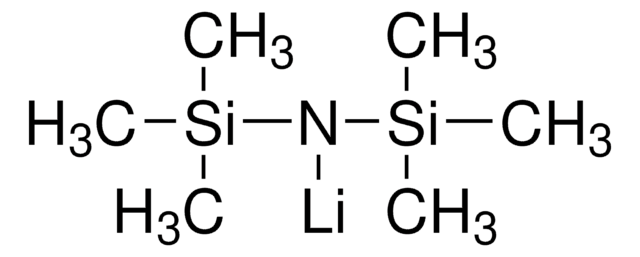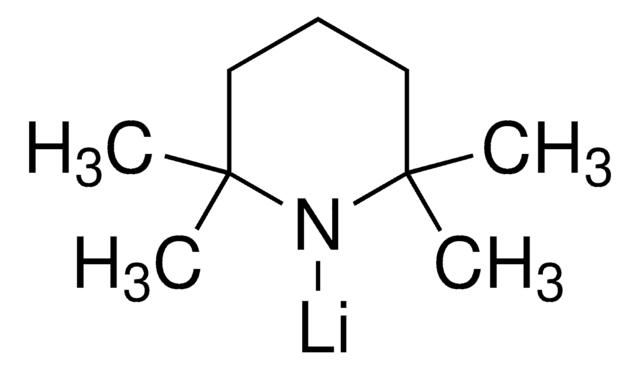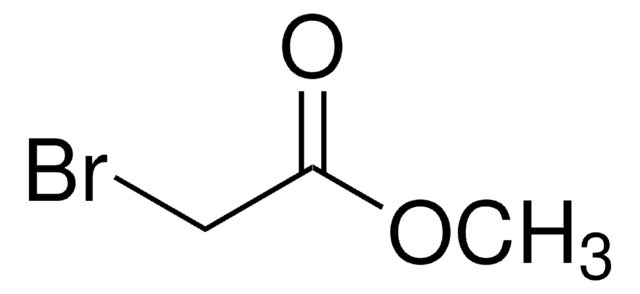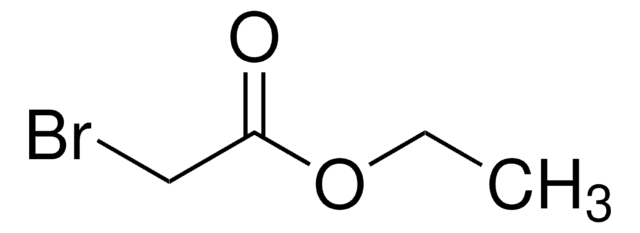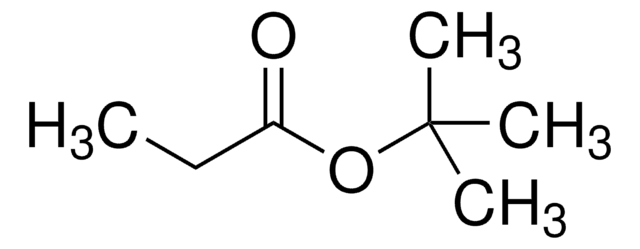246611
Lithium diisopropylamide
97%
Sinonimo/i:
LDA
Autenticatiper visualizzare i prezzi riservati alla tua organizzazione & contrattuali
About This Item
Formula condensata:
[(CH3)2CH]2NLi
Numero CAS:
Peso molecolare:
107.12
Beilstein:
3655042
Numero CE:
Numero MDL:
Codice UNSPSC:
12352001
ID PubChem:
NACRES:
NA.22
Prodotti consigliati
Densità del vapore
>1 (vs air)
Livello qualitativo
Saggio
97%
Stato
solid
Densità
0.864 g/mL at 25 °C (lit.)
Gruppo funzionale
amine
Stringa SMILE
[Li]N(C(C)C)C(C)C
InChI
1S/C6H14N.Li/c1-5(2)7-6(3)4;/h5-6H,1-4H3;/q-1;+1
ZCSHNCUQKCANBX-UHFFFAOYSA-N
Cerchi prodotti simili? Visita Guida al confronto tra prodotti
Categorie correlate
Descrizione generale
Lithium diisopropylamide (LDA) is a hindered non-nucleophilic strong base that abstracts hydrogen from active carbon. It can be prepared from diisopropylamine and butyllithium in the presence of tetrahydrofuran.
Applicazioni
Lithium diisopropylamide can be used for the generation of carbanion or enolate anions from carbonyl group-containing compounds.
It can also be used as a base in:
It can also be used as a base in:
- The direct alkylation and acylation of ketones.
- The aldol condensation reaction.
- α-Selenation reaction.
- The synthesis of α, β- unsaturated carbonyl compounds from carbonyl compounds.
- The alkylation of acids, esters, amides, and nitriles.
- The initiation of anionic polymerization.
Avvertenze
Danger
Indicazioni di pericolo
Classi di pericolo
Eye Dam. 1 - Pyr. Sol. 1 - Skin Corr. 1B
Rischi supp
Codice della classe di stoccaggio
4.2 - Pyrophoric and self-heating hazardous materials
Classe di pericolosità dell'acqua (WGK)
WGK 2
Dispositivi di protezione individuale
Eyeshields, Faceshields, Gloves, type P3 (EN 143) respirator cartridges
Scegli una delle versioni più recenti:
Possiedi già questo prodotto?
I documenti relativi ai prodotti acquistati recentemente sono disponibili nell’Archivio dei documenti.
I clienti hanno visto anche
Journal of Polymer Science Part A: Polymer Chemistry, 32, 2425-2425 (1994)
Aldrichimica Acta, 17, 80-80 (1984)
Joshua D Schaefferkoetter et al.
Physics in medicine and biology, 60(14), 5543-5556 (2015-07-03)
In the context of investigating the potential of low-dose PET imaging for screening applications, we developed methods to assess small lesion detectability as a function of the number of counts in the scan. We present here our methods and preliminary
Juan Eugenio Iglesias et al.
NeuroImage, 115, 117-137 (2015-05-06)
Automated analysis of MRI data of the subregions of the hippocampus requires computational atlases built at a higher resolution than those that are typically used in current neuroimaging studies. Here we describe the construction of a statistical atlas of the
Erwei Yin et al.
IEEE transactions on neural systems and rehabilitation engineering : a publication of the IEEE Engineering in Medicine and Biology Society, 23(4), 693-701 (2015-02-24)
The present study proposes a hybrid brain-computer interface (BCI) with 64 selectable items based on the fusion of P300 and steady-state visually evoked potential (SSVEP) brain signals. With this approach, row/column (RC) P300 and two-step SSVEP paradigms were integrated to
Global Trade Item Number
| SKU | GTIN |
|---|---|
| 246611-25G | 4061825876870 |
| 246611-100G | 4061825876856 |
Il team dei nostri ricercatori vanta grande esperienza in tutte le aree della ricerca quali Life Science, scienza dei materiali, sintesi chimica, cromatografia, discipline analitiche, ecc..
Contatta l'Assistenza Tecnica.

